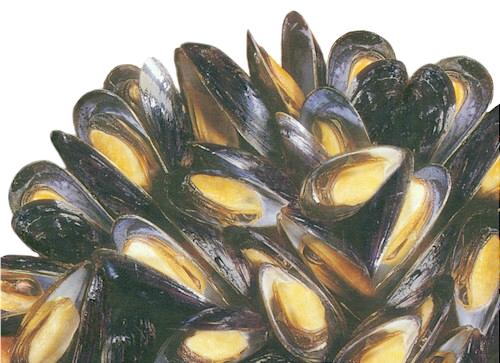 |
Elongated,
narrow shells distinguish mussels from other edible
bivalves. Many varieties grow worldwide, but blue and
green mussels most commonly appear in local markets.
Identified by their inky, blue-black shells, blue
mussels grow wild or are farmed in cold Atlantic and
Pacific waters, while jade-color "greenshells" come
from New Zealand. All varieties offer a good source of
protein, calcium, magnesium, and selenium.
PURCHASE AND
STORE:
- Mussels are sold
live, either loose or in bags packaged by growers.
- Store mussels in the
perforated bag they came in or in an open container
covered only with damp paper towels. (Mussels will
suffocate if covered in fresh water.) Stored
properly in the refrigerator, they keep about one
week.
- Recently (January 2013) I purchased
frozen New Zealand Green Mussels, thawed them (make sure you set the box
in a bowl to catch the drippings) in the refrigerator, and prepared them
similar to oyster Rockefeller and they were delicious, even warmed up
the next day. Preparation instructions were on the box.
PREPARE:
- Before cooking,
scrub mussel shells to remove the beard (fibrous
threads) and any mud. Cultivated mussels are
generally very clean and may not have any beard to
remove.
- Squeeze the shells
of any mussel that feels particularly heavy, and try
to slide the two halves back and forth. If you see
mud oozing out, discard the mussel.
- Mussels must be
alive before cooking (unless frozen, see above). After rinsing, their shells
should be tightly closed. Do not prepare any that
are open or have shells with holes or broken pieces.
COOK:
- The simplest way to
cook mussels is to steam them in white wine or broth
and herbs. Bring about one inch of liquid to a boil,
add the mussels, and then cover the pot tightly. In
three to five minutes, the mussels will be done. Finely chopped
sweet onions and/or fresh garlic can be sautéed in butter in the pan
first for added flavor.
ENJOY:
- Remove the meat from
the shells with a small fork. Or use an empty mussel
shell as tongs to pluck the meat away from the rest.
- Cooked mussel meat
appears either orange-pink (females) or beige
(males). There is no difference in flavor.
- Serve mussels with their cooking broth -- and with
bread for sopping the flavorful liquid at the bottom
of the bowl.
FROM COSTAL
LIVING MAGAZINE
TEXT BY JULIA DOWLING RUTLAND
FOOD STYLING BY GINGER SHERRILL
Modified by Art Guyer
|

